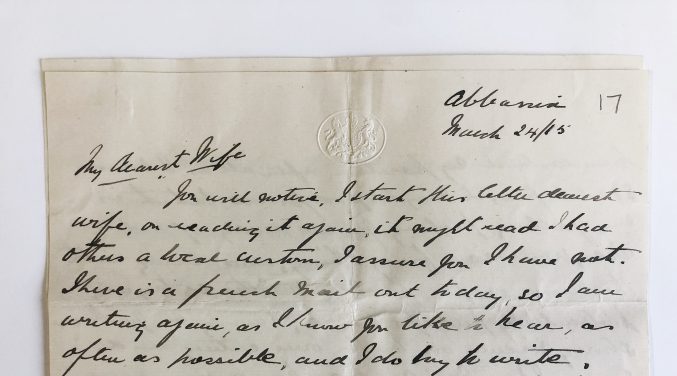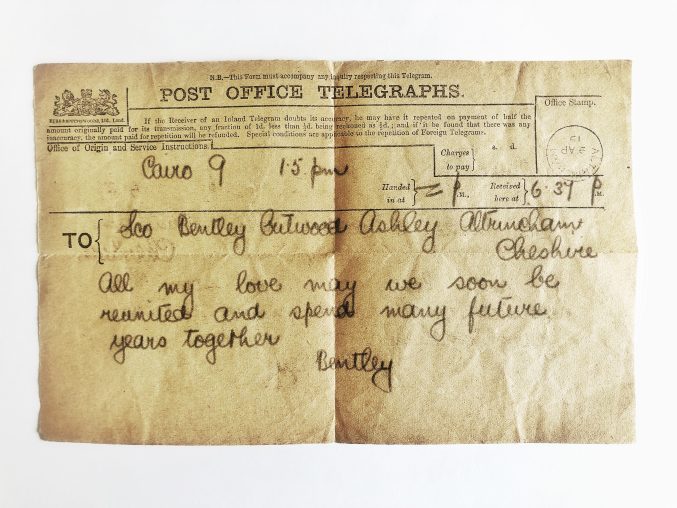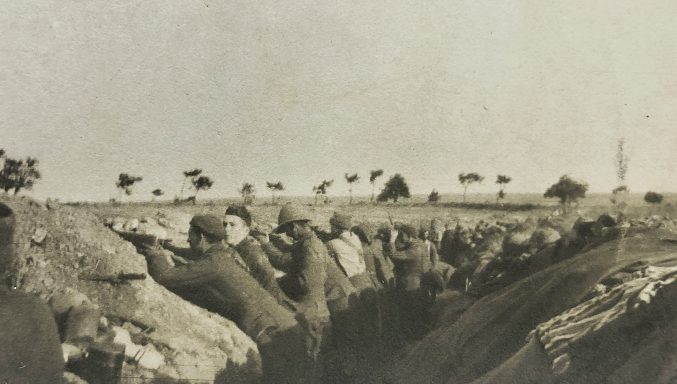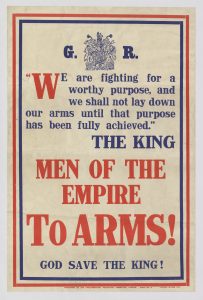Dearest Wife!
Posted on by Fay Curtis.
By Pat Ellingham, Volunteer, British Empire & Commonwealth Collection (BECC)
Around this time of year, sentiments of love and devotion waft in the air as Valentine’s Day approaches. As I sat with the latest collection I’m cataloguing as a volunteer for BECC, I found myself increasingly pulled towards the tender story of Colonel Frank Bentley. He fought with the 8th Ardwick Battalion of the Manchester Territorials in 1914–15.
‘Dearest Wife!’ Bentley starts one of the letters to his wife, Nora, with a joke about how this makes it sound as if he has many other wives. He explains that he is referring to the custom of taking several wives in parts of Egypt, from where he is writing.
Bentley had been a Territorial Army Officer, and volunteered for action in August 1914. He was sent to Egypt with his regiment to relieve the Regular Army units who were being transferred to the Western Front. He believed, as so many did, that the war would soon be over.
As an officer he would have been aware of censorship so his letters avoid military details. Instead, he confides in his ‘Dearest Wife,’ about his complex feelings: the frustrations of waiting for action, the internal politics of his battalion and his worries that he volunteered too soon.
Writing from Alexandria in October 1914 he hopes she will be able to join him, as some other officers’ wives have done. He sends messages and gifts for their three children, and silk shawls and aquamarines for her. As an affluent man in civilian life (he owned a paint factory) he is comforted, he tells her, that she is well cared for financially. His letters are full of yearning to be reunited with her, writing in February 1915 that:
‘I would give anything nearly, to have a look at you, when we do meet, I shall require almost introducing, and I suppose you will be quite a shy girl again.’
He sends a telegram on their wedding anniversary in April 1915 saying:
‘All my love may we soon be reunited and spend many future years together Bentley.’
In the desert he looks at the stars on a sleepless night thinking of her, and dining alone at Shepherds Hotel in Cairo in May 1915 he notices:
‘a very good looking couple sat at the next table, she was dressed in black. I thought she was rather like you. She wore a necklet of amber beads, she looked very nice, I thought, so yesterday I sent a necklet of amber beads home to Mrs Bentley…’
At the beginning of June 1915 Bentley writes that he is at sea, ‘on way to fight the Turks.’ The next letter is from Ras-el-Tin Hospital in Alexandria, to say that he has been ‘invalided.’
Bentley later writes as candid an account as the Censor will allow of the action he saw. This culminated on 4 June 1915 when the Manchester Brigade attacked the Turkish trenches. He writes of ‘tremendous bombardment by our artillery’ and describes taking the trench and witnessing the death of his superior, Colonel Heys. He notes the list of officers killed or badly wounded, and that at the end of the day he was the only remaining officer, holding position for three days to get reinforcements:
‘I kept my head right through. Honestly I do not want to go through it again.’
Colonel Bentley was relatively old for active service at 45, and admits after the Dardanelles that he feels too old for trench warfare. His rheumatism is plaguing him, part of the reason he is eventually invalided out. Before his return he writes a passionate affirmation of his love for his wife, and draws a mark of where he has kissed the letter:
‘and never forget that you are always in my thoughts, and you made me love you, and it is lasting.’
Colonel Bentley returned home in late July 1915, and was transferred to the Reserve of Officers, according to a newspaper cutting. Their story fades then, but I like to think that Frank and Madge did have many contented days together in the following years, and that she often wore her amber necklace. The authentic voices of individuals from the past are an invaluable resource, which Bristol Archives makes accessible through collections such as this.
Images:
- WW1 recruiting poster (2003/001/013)
- Photograph of trench warfare taken by Bentley (2007/005/102/2/12)
- Bentley’s wedding anniversary telegram to his wife (2007/005/102/2/17)
- One of the letters in the collection (2007/005/102/1/17)



